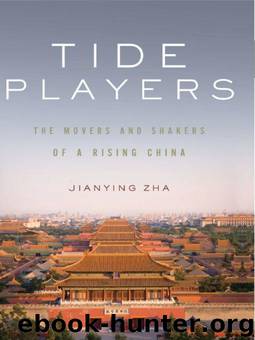Tide Players by Jianying Zha

Author:Jianying Zha
Language: eng
Format: mobi
ISBN: 9781595586988
Publisher: Perseus Books Group
Published: 2011-03-28T21:00:00+00:00
6.
After our dinner, Zhang Weiying e-mailed me a number of his articles on university reform. Unlike the author of the cool, technical, official Beida documents, Zhang in these articles was more frank and more thoughtful.
He was also quietly passionate, as a man who was fully aware of the weight of his task and the importance of careful reasoning. The central piece was a long essay entitled “The University’s Logic,” based on an interview Zhang gave to a Beijing newspaper. Here Zhang offered an incisive, bold analysis of the problems of Chinese higher education. In his view, nearly all the problems could be tracked to two sources: government control and the unsatisfactory quality of the professors. He did not mince his words about either one.
Chinese universities, Zhang wrote, are the product of China’s old planned economy. They are in fact special institutions set up by the government. When all the fundamentals of a university—funding, appointment of the president, organizational structure, size of faculty, curriculum, degree programs, enrollment quota, admission, and tuition—are determined and controlled by the government, the university has very little autonomy. It is not a real university. The only competition within such a system is the unhealthy battling—often through personal connections—for government funding and quotas; and because these battles often depend on the skills of the administrators, it makes them overly powerful and results in a swollen bureaucracy. The officials clamor everyday about “world-class university” and “academic prosperity,” but they themselves are the roadblocks of academic progress. “If China wants to produce world-class universities,” Zhang wrote, “I think the way of government controlling the university must be truly, thoroughly changed, and the university must be allowed to govern [itself]. Otherwise, there is no hope for a first-rate university.”
This was sharp and direct. Unfortunately, Zhang admitted, changing this basic paradigm is beyond any Chinese university’s power. Commenting on the trends of university reform in Europe and Japan, where the state also plays a heavy role in higher education, Zhang noted that the situation is much worse in China. Unlike in Europe, Chinese universities have almost no tradition of self-governance and therefore few resources with which to confront the government. So, as important and urgent as it is, we can only urge the government to be more liberal.
But Zhang isn’t satisfied to be merely a finger-pointing critic. His philosophy is that one should do whatever is within one’s power to improve the situation. What the Chinese university can do, he thought, is a kind of partial reform. If we can’t alter the university’s relationship with the government, we can perhaps try to handle the other problem: the unsatisfactory quality of the professors. China’s reform of the big state factories, Zhang pointed out, had also started with small steps, such as introducing the bonus system and encouraging worker mobility. Later it went deeper. At the university, Zhang thought, faculty is the most crucial element, so if we were to design a system that promotes more openness, mobility, and competition on scholarship rather than playing politics, it would help raise the quality level of the faculty.
Download
This site does not store any files on its server. We only index and link to content provided by other sites. Please contact the content providers to delete copyright contents if any and email us, we'll remove relevant links or contents immediately.
| China | India & South Asia |
| Japan |
Fanny Burney by Claire Harman(25796)
Empire of the Sikhs by Patwant Singh(22189)
Out of India by Michael Foss(16317)
Leonardo da Vinci by Walter Isaacson(11927)
Small Great Things by Jodi Picoult(6113)
The Six Wives Of Henry VIII (WOMEN IN HISTORY) by Fraser Antonia(4802)
The Wind in My Hair by Masih Alinejad(4431)
The Lonely City by Olivia Laing(4134)
The Crown by Robert Lacey(4122)
A Higher Loyalty: Truth, Lies, and Leadership by James Comey(4045)
The Iron Duke by The Iron Duke(3657)
Millionaire: The Philanderer, Gambler, and Duelist Who Invented Modern Finance by Janet Gleeson(3577)
Sticky Fingers by Joe Hagan(3461)
Alive: The Story of the Andes Survivors by Piers Paul Read(3325)
Papillon (English) by Henri Charrière(3283)
Joan of Arc by Mary Gordon(3272)
Stalin by Stephen Kotkin(3096)
Aleister Crowley: The Biography by Tobias Churton(3032)
Ants Among Elephants by Sujatha Gidla(2932)
